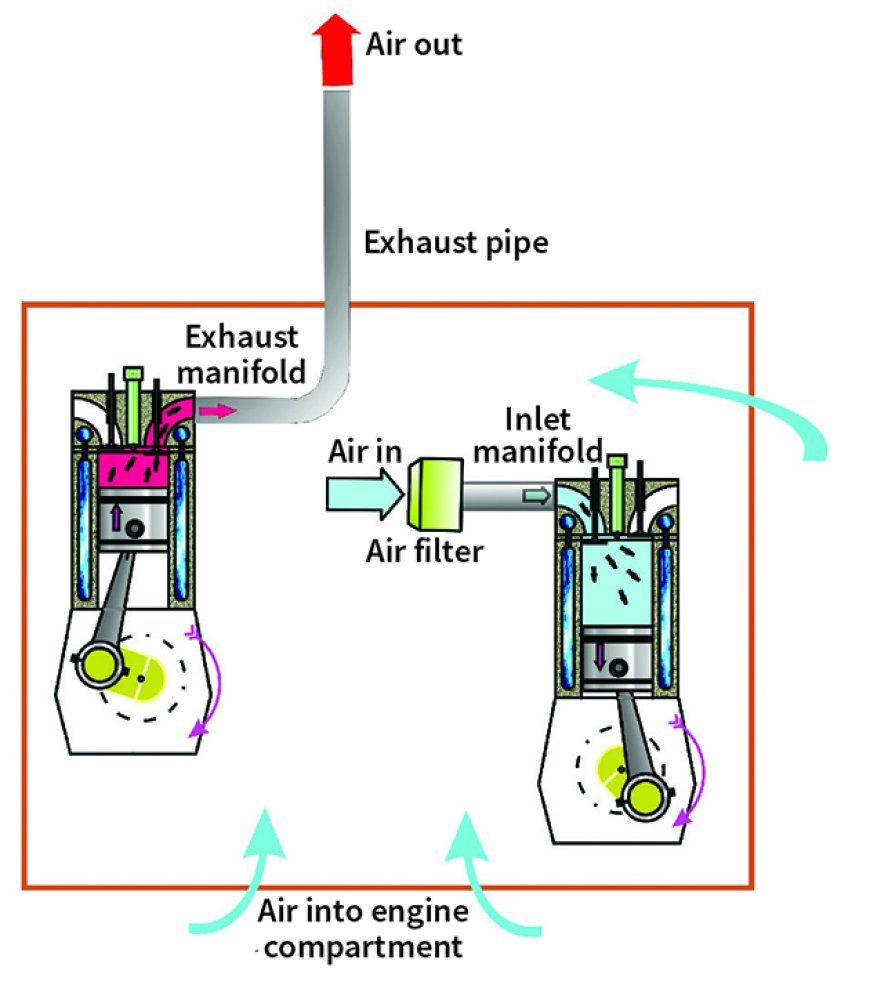Don't Be a Dust-Buster: Upgrade Your Engine's Air Filter Today
a detailed overview of current trends, forecasts, and projected dollar values for the global automotive engine air filter market through 2032

Infinium Global Research delves into the automotive engine air filter market with a recent report offering a comprehensive analysis of global and regional segments and sub-segments. The study sheds light on the short- and long-term impact of key drivers, restraints, and macro indicators shaping this market. It provides a detailed overview of current trends, forecasts, and projected dollar values for the global automotive engine air filter market through 2032. Notably, the report predicts moderate growth with a projected Compound Annual Growth Rate (CAGR) of 1.8% for the global automotive engine air filter market over the next eight years (2024-2032).
To Get More Business Strategies for Request Sample Report @: https://www.infiniumglobalresearch.com/reports/sample-request/20720
Automotive Engine Air Filter Market Dynamics: A Shift Towards Efficiency and Cleanliness (2024-2032)
The automotive engine air filter market plays a critical role in maintaining engine health and fuel efficiency. These filters prevent harmful contaminants like dirt, dust, and pollutants from entering the engine, protecting the combustion system and optimizing vehicle performance.
Here's a breakdown of the key factors shaping the market dynamics in the coming years (2024-2032):
Growth Drivers:
· Fuel Efficiency Focus: As fuel efficiency remains a top priority for both consumers and manufacturers, the demand for air filters that optimize engine performance and minimize fuel consumption will surge.
· Stricter Emission Regulations: Governments worldwide are implementing stricter emission regulations to combat air pollution. This will drive the adoption of advanced air filter technologies that meet these stringent standards. (e.g., BS-VI emission regulation in India)
· Increased Replacement Frequency: Regular air filter replacement is crucial for maintaining engine health. As vehicles accumulate mileage, this translates to more frequent filter changes, creating a steady demand in the aftermarket.
· Innovation in Filtration Technology: Market players are constantly developing new filtration technologies that offer improved particle-removal efficiency, minimize airflow restriction, and ultimately enhance engine performance. This focus on innovation will create fresh growth opportunities.
Challenges and Restraints:
· COVID-19 Impact: The ongoing pandemic's initial disruptions, including lockdowns and limited consumer spending, negatively impacted the automotive industry and, consequently, the demand for engine air filters. However, the market is expected to recover and resume its growth trajectory.
· Rise of Electric Vehicles (EVs): The increasing popularity of EVs poses a potential challenge to the traditional automotive engine air filter market. As EVs lack combustion engines, they don't require air filters in the same way.
Air Filter Market: Breathing Easy Through 2032
Air quality remains a top concern as dust, pollution, and allergens continue to plague modern environments. Here's where air filters step in – these multi-layered guardians utilize porous and fibrous materials to capture dust, pollen, and other unwanted particles from circulating air. Advanced options like HEPA and ULPA filters go even further, tackling microscopic and potentially harmful contaminants invisible to the naked eye.
The air filter market is poised for significant growth in the coming years (2024-2032) driven by several key factors:
· Rising Airborne Illness Concerns: As awareness of respiratory issues grows, the demand for air filters to combat allergens and pollutants increases.
· Urban Pollution on the Rise: With growing urbanization, air quality in cities deteriorates, propelling the need for air filtration solutions.
· Increased Health Consciousness: A growing focus on preventative healthcare and healthy living fuels the adoption of air filters for improved indoor air quality.
· Improved Living Standards & Disposable Income: As economies rise, people prioritize health and invest in air filters for a cleaner breathing environment
Multiple factors are converging to create a boom in the air filter market:
· Demand for Cabin Comfort and Innovation: Consumers are increasingly prioritizing comfort and health in their vehicles and living spaces. This translates to a growing demand for advanced air filtration systems that contribute to a more pleasant and healthy environment.
· R&D Investments Drive Innovation: Continued investments in research and development will lead to more efficient and effective air filtration technologies. These advancements will further improve air quality and cater to diverse consumer needs.
· HVAC Integration and Hygiene Focus: Advancements in Heating, Ventilation, and Air Conditioning (HVAC) systems will create new opportunities for integrating high-performance air filters. Additionally, the rising emphasis on maintaining hygiene in homes and workplaces will fuel demand for air filtration solutions.
· Air Quality Awareness and Education: Public awareness of declining air quality is on the rise. As consumers become more familiar with the benefits of filtered air, the market for air filters is poised for significant expansion. This includes a growing understanding of Air Quality Index (AQI) and its impact on health.
Market Segmentation
Vehicle Type:
· Passenger Vehicles: This segment caters to the air filter needs of cars, SUVs, and other personal use vehicles.
· Commercial Vehicles: This segment focuses on air filters for trucks, buses, and other heavy-duty vehicles with specific performance requirements.
Sales Channel:
· Aftermarket: This segment comprises the replacement air filters sold through auto parts stores, repair shops, and online retailers. It caters to existing vehicles requiring filter replacements.
· OEM (Original Equipment Manufacturer): This segment focuses on air filters pre-installed in new vehicles by manufacturers during production.
Material Type:
· Paper: The most common and cost-effective option, paper air filters offer good performance for everyday driving conditions.
· Cotton Gauze: Reusable and known for high airflow, cotton gauze filters are popular for performance-oriented vehicles.
· Foam (Polyurethane): Offering good filtration and dust-holding capacity, foam filters are a less common option due to potential clogging issues.
· Other Material Types: Advanced materials like synthetic blends are being explored to create high-performance and long-lasting air filters.
Regional Impact:
Asia Pacific (APAC): This region remains the undisputed leader, holding the largest market share. The surge in passenger and commercial vehicle demand from countries like China, India, Japan, and Indonesia is a key driver. Additionally, factors like:
· Low labor costs
· Favorable government policies attracting foreign investment (FDI)
· Growing disposable income
· Increasing focus on vehicle maintenance
· These elements collectively propel the APAC market's dominance.
North America: This region boasts a strong presence of leading automotive engine air filter manufacturers. Stringent government regulations aimed at reducing carbon emissions are also driving market growth. However, the market may face some saturation due to mature economies and established infrastructure.
Europe: The European market presents a mix of growth opportunities and challenges. Stringent emission regulations and a focus on environmental sustainability are positive factors. However, a potential slowdown in vehicle production and economic fluctuations could hinder growth.
Rest of the World (ROW): This region encompasses emerging economies with significant growth potential. As these markets experience rising disposable income and increasing vehicle ownership, the demand for automotive engine air filters is expected to rise steadily. However, factors like limited infrastructure and fragmented markets may pose challenges.
Why to Buy this Report?
• Accurate analysis of business strategies of key players in the global Automotive Engine Air Filter market with breakdown of their value chain, raw materials, and industry variables
• Easy to understand, to-the-point data, statistics, and information on the global Automotive Engine Air Filter market, its segments and sub-segments
• In-depth research about distribution channels and the supply chain including retailers, wholesalers, manufacturers, dealers, suppliers, and consumers
• Thorough evaluation of key regional Automotive Engine Air Filter markets based on CAGR, supply and demand, macroeconomic patterns, customer purchasing patterns, and several other factors.
The report has been meticulously put together using a SWOT and a PESTLE analysis. Upon requests, the report on the global Automotive Engine Air Filter market can be customized to suit client needs.
Request full Report: https://www.infiniumglobalresearch.com/reports/global-automotive-engine-air-filter-market
Competitive landscape
· A.L. Filter Ltd.
· ALCO Filter
· Baldwin Filtering Medium
· Cummins
· DENSO Corporation
· Donaldson Company, Inc.
· Fildex Filter Canada Corp
· filtrak brandt gmbh
· K&N Engineering, Inc
· MAHLE International GmbH
Future outlook and conclusion:
The Infinium Global Research report focuses on the 2020-2026 timeframe, looking ahead to 2032, the market presents a fascinating interplay of established trends and emerging challenges. The report's analytical tools, like Porter's Five Forces and DRO analysis, can be extremely valuable in navigating this dynamic landscape. Understanding factors that drive and restrain growth, along with insights into future trends, will be crucial for both existing and new market players. The IGR-Growth Matrix analysis, for instance, can guide informed investment decisions. By capitalizing on areas like stricter emission regulations and the need for efficient engine performance, companies can carve a niche in this evolving market. However, the long-term impact of electric vehicles cannot be ignored. The report's competitive analysis across regions provides a springboard for companies to assess their standing and strategize for future success. Ultimately, the ability to adapt to a changing automotive landscape, potentially by creating solutions compatible with both traditional and electric vehicles, will be a key differentiator for players in the automotive engine air filter market.
What's Your Reaction?
 Like
0
Like
0
 Dislike
0
Dislike
0
 Love
0
Love
0
 Funny
0
Funny
0
 Angry
0
Angry
0
 Sad
0
Sad
0
 Wow
0
Wow
0


















































